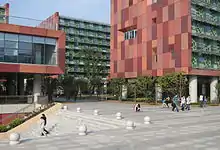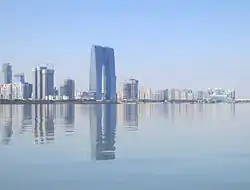Suzhou Industrial Park
The China–Singapore Suzhou Industrial Park (simplified Chinese: 中国—新加坡苏州工业园区; traditional Chinese: 中國—新加坡蘇州工業園區; pinyin: Zhōngguó—Xīnjiāpō Sūzhōu Gōngyè Yuán Qū), or Suzhou Industrial Park for short, abbreviated as SIP, is a county-level administrative area located in Suzhou, Jiangsu with a little Singaporean influence.
Suzhou Industrial Park
苏州工业园区 | |
|---|---|
_-_West_Bank_of_Jin_Ji_Lake.jpg.webp) The park with the west bank of Jinji Lake | |
| Coordinates: 31°19′26″N 120°43′24″E | |
| Country | People's Republic of China |
| Province | Jiangsu |
| Prefecture-level city | Suzhou |
| Area | |
| • Total | 288 km2 (111 sq mi) |
| Population | c. 2,000,000 |
| Time zone | UTC+8 (China Standard) |
| Website | http://www.sipac.gov.cn/english/ |
Background
_The_Art_Sculpture_of_Harmony.jpg.webp)
In 1992, the idea of developing a modern industrial township with Singapore experience was broached. During his tour of southern China that year, China's late paramount leader Deng Xiaoping said: "Singapore enjoys good social order and is well managed. We should tap on their experience, and learn how to manage better than them."
After rounds of discussions and site surveys, both governments decided to join hands in developing a modern industrial park in the east of Suzhou. The China–Singapore Suzhou Industrial Park (CS-SIP) was thus born on February 26, 1994 when Chinese Vice Premier Li Lanqing and Singapore Senior Minister Lee Kuan Yew signed the Agreement on the Joint Development of Suzhou Industrial Park in Suzhou.[1]
Geography
SIP has a total jurisdiction area of 288 km2, of which, the China-Singapore cooperation area covers 80 km2 with a planned residential population of 1.2 million. The China-Singapore Joint Steering Council led by Chinese Vice Premier Wu Yi and Singapore Deputy Prime Minister Wong Kan Seng will hold meeting every year to give directions for the development of SIP.[2]
Jinji Lake (literally Golden Rooster Lake) is a small fresh water lake located in the central part of Suzhou Industrial Park. It occupies an area of 7.18 square kilometres and its average depth is about 2.5 to 3 metres. There are two man-made islands in the lake.[3]
Dushu Lake is a small fresh water lake located in southern part of Suzhou Industrial Park, with an area of about 9.48 square kilometers.
Economy
Reports surfaced in 2019 that the park was being affected by the US-China trade war, with exports having declined 10 per cent over the first seven months of 2019 when compared to 2018 figures, while imports have fallen 15 per cent over the same period.[4]
Education
Universities and higher education

There is Suzhou Dushu Lake Higher Education Town, one of the government's key projects. Located east of Dushu Lake, it has a total area of 25 km2, and expects to have around 400,000 people by 2016, 100,000 of whom will be students. Its goal is to offer good education, advanced technology, and a pleasant living environment. The area is home to many universities (undergraduate as well as graduate schools) including local Chinese universities and universities from other countries. This community focuses on producing educated and creative people.[5] The area offers facilities including libraries, entertainment venues, parks, a sports centre and accommodation. Wenxing Plaza and Hanlin Plaza are popular locations of many small restaurants and shops. Dushu Lake Library is an experimental library of the National Digital Library. Major universities include Suzhou University, Xi'an Jiaotong-Liverpool University and Renmin University of China, Suzhou Campus.
Controversy
The SIP ran into trouble when local officials began building Suzhou New District (SND) industrial park to compete with it. As the Suzhou city government had only a minority 35 percent stake in the SIP, while they had a major stake in SND, the city government largely ignored SIP and concentrated on promoting the SND instead.
The project was supposed to transfer Singapore's management skills to Chinese bureaucrats and to teach China how to build and run "business-friendly" commercial parks. But it ended up straining the close relations between Singapore and China and bringing home to Singaporeans the often unpredictable, and sometimes underhand, business culture of the Communist mainland.[6]
Singapore's senior minister, Lee Kuan Yew conceded that the project had not turned out as planned and had made him more cautious about investments in China. He pointed to the difficulties that arose in signing agreements with the central government that were then implemented by local officials who "have their own imperatives".[6]
.jpg.webp)
After incurring losses of some US$90 million over 5 years,[7] the Singapore consortium lowered its stake to 35 percent, raising the Chinese consortium's stake to 65 percent from 35 percent and reducing the Singaporean share from a planned 70 km2 to just 8 km2.[8] The Chinese side appointed Wang Jinhua, vice-mayor of Suzhou and the former manager of the New District, as the new chief executive.

Later Success
In 2001, one year after Singapore lowered its stake, the park made its first profit of $3.8 million.[9] The SIP was initially considered to be a failure with multiple setbacks but have turned out to be a success after 25 years. As of 2020, SIP has contributed about 800 billion yuan ($119.11 billion) in tax revenue, and has achieved more than $1 trillion in foreign trade volume.[10] SIP, as part of the Suzhou New District (SND) has been a hotspot for development in recent years. Success of the SIP as an avenue for investment has resulted in the Suzhou government imposing property curbs as much as four times in 2019 to cool down property prices in the SIP.[11]
The Korean governments have modelled the Kaesong Industrial Region upon seeing the success of SIP.[12] Another industrial park which modelled after SIP is the China-Belarus Industrial Park.[13]
See also
References
- see Alexius A. Pereira (2003) State Collaboration and Development Strategies: The Case of the China Singapore Suzhou Industrial Park (1992-2002). London: Routledge.
- "Suzhou Industrial Park". RightSite.asia. 1994-02-26. Retrieved 2012-02-07.
- 金鸡湖景区 (in Chinese). Retrieved 2012-06-28.
- "In a giant industrial estate, Chinese officials scramble to keep foreign tenants". South China Morning Post. September 15, 2019.
- 苏州独墅湖高等教育区 (in Chinese). Sipedi.com. Archived from the original on 2012-02-07. Retrieved 2012-02-07.
- Richardson, Michael; Tribune, International Herald (October 1, 1999). "Singapore Industrial Park Flounders : A Deal Sours in China" – via NYTimes.com.
- "Losses in Singapore Suzhou project to hit US$90 million", Agence France-Presse, September 15, 1999
- "Suzhou project: wounded pride". Ben Dolven, Far Eastern Economic Review, July 8, 1999.
- "The new frontier". Ben Dolven, Far Eastern Economic Review, December 6, 2001.
- "Suzhou Industrial Park celebrates 25 years". China Daily. April 12, 2019.
- "Suzhou tightens property curbs for the fourth time in 2019 as overheating home market has defied policies to cool prices". South China Morning Post. July 25, 2019.
- "外媒:韩朝欲国际化开城园区 效仿苏州工业园". Sohu (in Chinese). August 17, 2013.
- "Interview: China-Belarus Industrial Park propels Belarusian economy". Xinhua. August 11, 2018.
_Science_%2526_Technical_Center.jpg.webp)
